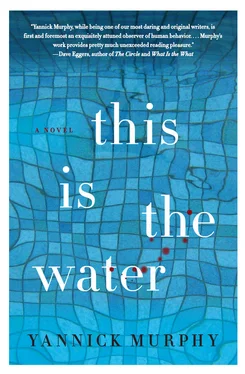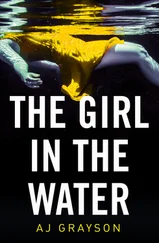“No, he’s not,” you say.
“I think he is,” Chris says.
“I’m sorry, but I just can’t believe that,” you say, because you can’t.
“Well, there’s so much I can’t explain,” Chris says. “So much he can’t explain. It’s got to be the answer.”
“You’re wrong,” you say. Chris swallows hard. You can hear the swallow. You are afraid the tears will start coming down again. “What man in his right mind would cheat on you?” you say.
“He’s started working late. He comes back and it’s after midnight. He says he’s working, but he never used to work this hard.”
“That’s it?” you say. “He works late and you think he’s been cheating on you? It doesn’t sound like enough to hang the guy.” You really don’t believe Paul is cheating on Chris. You realize all of a sudden that your daughter Alex is swimming her leg of the relay. She’s anchor and freestyling with all her might toward the wall for the win.
“I’m so sorry, but I just can’t help thinking that it’s a misunderstanding,” you say, touching Chris on the elbow just after your daughter touches the wall for the win. “I’m positive.”
You wonder why you are defending the man. You’ve never really had a conversation with him, you’ve never even talked to him up close, you just know him by sight — he’s come to a few practices and meets and you’ve seen him in the stands — whereas you and Chris have known each other for at least three swim seasons. She’s been to your house a few times to drop off Cleo to visit with your girls, and you’ve been to her house to drop off your girls to visit with Cleo. You’ve never seen Paul any of these times. Maybe he is cheating on Chris. Maybe he is banging one of his college students, a student who stays after class and leans over his desk asking him questions about things she knows he loves to talk about. It’s just hard to believe, considering how all the husbands you know let their tongues drop to their knees when they see Chris.
Sofia is in the next relay. She is standing with her shoulders hunched, and you wish she would look up in the stands and look at you so you could mouth the words “back straight” to her, and so you could throw your shoulders back too, demonstrating. You think that ever since Sofia started her period her posture has been worse, and you wonder if it’s just because the girl is that much more tired.
When she started her period she held out a panty liner and showed it to you. “Is this blood?” Sofia asked, and it was, the blood had stained the pad in the shape of an hourglass, and you looked at the design and considered how you were looking at it as if it were a Rorschach ink blot, and you wondered, if your girl kept showing you the bloodstains on her pads throughout the rest of her cycle, what more would you see in their shapes? Would you see a bird with its wings folded in? A hammer? A footbridge?
“I’m sorry to put this on you,” Chris says. “It’s just that I couldn’t talk to my family about it. They all think Paul and I have a perfect marriage, and that he’s a saint. They’d blame it on me.”
“Don’t be sorry, especially since I’m sure it’s nothing at all,” you say. “Sometimes I think Thomas is losing his mind. Just the other day he talked for hours about the decline of civilization, how he believes we’re going through it.”
Your daughter’s dive is beautiful — high and long. She’s the leadoff, and what a lead she’s given to her team before she’s even entered the water.
“How can I be sure it’s nothing?” Chris says.
“Don’t think about it, that’s all,” you say. “And watch Cleo swim. I see she’s up next. She’s a good swimmer. She’s graceful, like you. Sometimes I don’t care how fast a swimmer can swim. Sometimes I just like watching them move in the water. It’s as if the water makes way for them, like it’s taken aback by how good a swimmer can be. Do you know what I mean?” Chris looks at Cleo, and her daughter looks up at the stands, looking for her mother. “Wave to her, she doesn’t see you yet,” you say, and Chris waves to her daughter and then the daughter waves back and forth, smiling, and you think if you put your hand up in the air, in the space between where the two hands are waving at each other, you could feel some kind of a force, maybe Chris’s mother energy. You don’t know what the name of it is. Maybe it’s something Thomas would know. It’s a quark, a pulse, a gravitational field, a gluon of extreme magnitude.
C ontrary to popular belief, we are not all geniuses,” reads Floyd Arneson, our killer, while he’s at school on his computer. Right now there is no teacher in his office and the principal is at a meeting for the day. Floyd Arneson is an administrative assistant in an elementary school and his boss is the principal. The school runs almost all year round, because it also runs summer programs. Floyd Arneson calls himself a secretary because he has promised himself that he will not go through life fooling himself. I work as a secretary, he thinks to himself. I am also a killer. I know perfectly well what I am doing. I know perfectly well how I have to keep my knife very sharp or it will not cut easily through the skin, the fat, the larynx, and the tendons. I know very well how I have to dispose of my clothes afterward, how even a speck on the top of my shoe is a reason to dispose of the shoe and buy a new pair. Our killer is interested in himself and there is so much written about serial killers that he likes to know what is new and has been shared in the media. “Like the rest of the population,” he reads, “we range in intelligence from borderline to above average.” We could have wives and children. We could belong to the church. We could be the head of the church. We could have wet the bed. So many of us have wet the bed as boys. We could have pulled the tails of dogs, have stuffed cats into sacks. We could have splayed open wide the bellies of just-stunned birds not dead from their crash into glass they thought was just more world to fly through. We could suffer from psychopathy, we could be doctors, and we could be nurses, lawyers, and cooks. We could be women working with men, burying bodies in our yard. We could be women working alone. We could be extremely clever and intelligent, or we could be just average or below. We could be school secretaries, or we could be truck drivers. As children, we could have been plagued by nightmares or slept like babies. We could have set fires, or stolen purses, or tagged graffiti all over school walls. We could have helped our mother with the dishes and played nicely with the cat and done our homework every night. We could be the kid in school now, walking through the halls, holding the snack tray, careful not to let the cartons of milk fall over. The biggest myth, our killer reads, is that we want to get caught when really we do not want to get caught and we feel we cannot get caught. The killer laughs, he reads a line Jeffrey Dahmer once said, “When I was a little kid, I was just like anybody else.”
This is you driving home at night, nearing your house, where the tops of the pines on the hill shine metal-bright in the moonlight like sword tips.
These are the girls, running inside the house after you park the car in your driveway. They are after Thomas, jumping on his back and hugging him and wanting to know what he did without them while they were away. They want to know what food he ate, and Sofia bangs open the freezer, checking to see if he bought ice cream without them and left them some in the container. Alex shows him a sweatshirt she bought that has the name of the meet and her team logo printed on it, and then while Thomas isn’t looking, she takes the merchandise sticker off the sleeve, pats Thomas’s back, and says, “I missed you, Dad,” and the sticker is now stuck to the back of his shirt. “I missed you too! It’s good to have you home,” he says, trying to get another hug from her as Alex steps back from him and then doubles over with laughter, pointing at his back, saying, “Dad, you’re so gullible!”
Читать дальше












